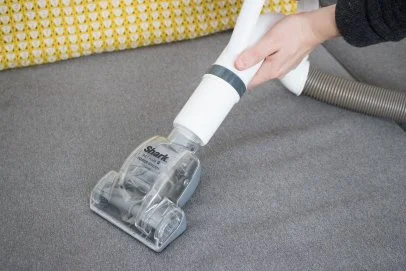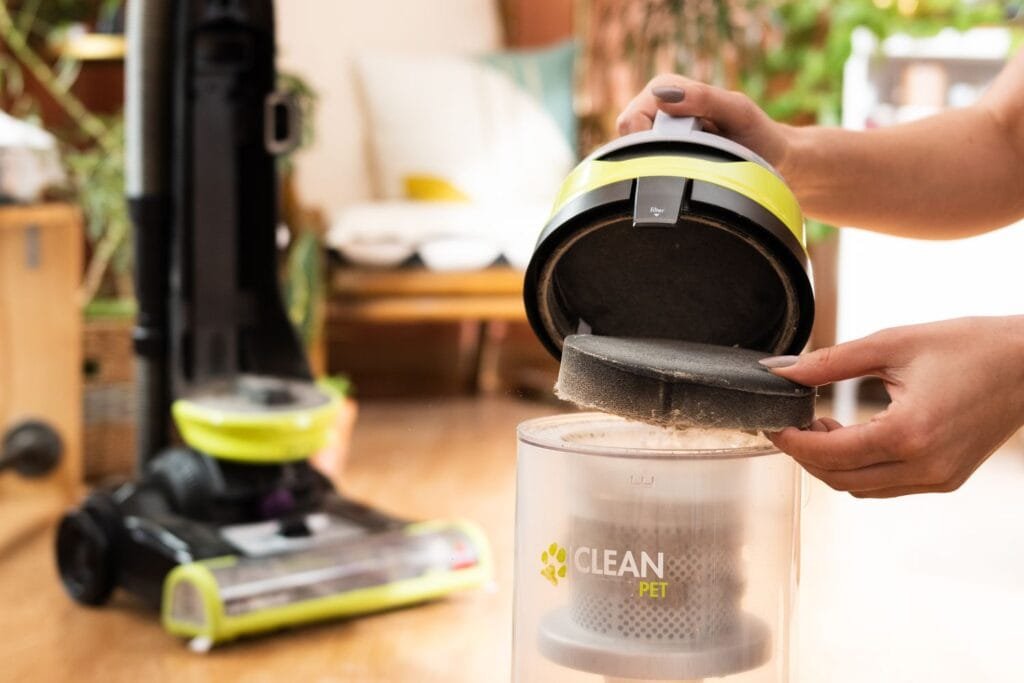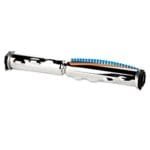To keep your vacuum working well, clean its filter often. But how often is enough?
Your vacuum filter collects dust and debris, preventing them from recirculating into the air. If it gets too dirty, your vacuum won’t work as well, and it might even blow dust back into your home. Cleaning the filter regularly helps maintain its suction power and ensures a healthier home environment.
In this blog post, we will explore how often you should clean your vacuum filter and why it’s important for both your vacuum’s performance and your health. Let’s dive in and find out the best cleaning schedule for your vacuum filter.
Importance Of A Clean Vacuum Filter
Maintaining a clean vacuum filter is crucial for the overall performance of your vacuum cleaner. It not only ensures the longevity of the appliance but also provides better cleaning results. Let’s delve into why keeping your vacuum filter clean is so important.
Improving Air Quality
A clean vacuum filter plays a significant role in improving the air quality in your home. When the filter is clogged, it can’t trap dust, pollen, and other allergens effectively. This means these particles are released back into the air, potentially causing respiratory issues.
Think about that time you vacuumed and found yourself sneezing more than usual. Chances are, your filter needed cleaning. By keeping your vacuum filter clean, you help reduce allergens and improve the air you breathe.
Enhancing Vacuum Efficiency
Another major benefit is enhanced vacuum efficiency. A clogged filter makes your vacuum work harder, reducing its suction power. This means you might need to go over the same spot multiple times to pick up all the dirt.
Have you noticed your vacuum making strange noises or leaving behind debris? It’s probably time to clean the filter. Regularly maintaining the filter ensures your vacuum operates at peak performance, saving you time and effort.
So, how often should you clean your vacuum filter? It depends on usage, but a good rule of thumb is to check it monthly and clean it if needed. Your vacuum—and your lungs—will thank you.

Credit: www.instagram.com
Types Of Vacuum Filters
Understanding the types of vacuum filters is essential for maintaining your vacuum. Each filter type needs different care. Knowing how often to clean them can make your vacuum last longer. Let’s look at some common types of vacuum filters.
Hepa Filters
HEPA filters trap tiny particles, including allergens. These filters need cleaning every few months. If you have pets, clean them monthly. Clean the filter by tapping it gently over a trash can. Do not wash it unless the manual says so.
Foam Filters
Foam filters are washable. Clean them every month. Rinse them under warm water. Squeeze out the excess water and let them air dry. They are durable and easy to maintain.
Bag Filters
Bag filters collect dust in a bag. Replace them when the bag is two-thirds full. Some bags are reusable. For reusable bags, empty and clean them regularly. Always check the condition of the bag for any tears.
Signs Your Filter Needs Cleaning
Keeping your vacuum filter clean is crucial for maintaining its efficiency. A dirty filter can lead to several issues. Recognizing the signs that your filter needs cleaning helps you act promptly.
Reduced Suction Power
One common sign is a drop in suction power. If your vacuum is not picking up debris like it used to, the filter might be clogged. A clean filter ensures maximum airflow, making your vacuum work efficiently.
Unpleasant Odors
Another sign is the presence of bad smells. A dirty filter can trap dust and debris, leading to unpleasant odors. If your vacuum emits a foul odor during use, it’s time to check and clean the filter.

Credit: www.hgtv.com
Factors Affecting Cleaning Frequency
The frequency of cleaning your vacuum filter depends on usage, type of debris, and the vacuum model. Regular maintenance ensures efficient performance and prolongs the vacuum’s lifespan.
When considering how often you should clean your vacuum filter, several factors can influence the frequency. Not all households are the same, so it’s essential to evaluate your specific situation. Let’s delve into the key factors that impact how often you need to clean your vacuum filter.Household Size
The number of people living in your home directly affects the amount of dust and debris your vacuum collects. A larger household typically means more foot traffic, more dirt, and more frequent vacuuming. For instance, in a home with four or more members, you might find that your vacuum filter needs cleaning every couple of weeks to maintain optimal performance.On the other hand, a single-person household may only need to clean the filter once a month. Think about how often you vacuum and adjust the cleaning schedule accordingly.Pet Ownership
If you’re a pet owner, you know how much fur and dander your furry friends can shed. Pets significantly increase the amount of debris your vacuum has to handle.In homes with pets, you should consider cleaning the filter after every few uses. This helps to keep the vacuum running efficiently and prevents unpleasant odors. Regular filter maintenance is crucial to ensuring that your vacuum can keep up with the extra load.Allergy Considerations
If you or someone in your household suffers from allergies, maintaining a clean vacuum filter is even more critical. A dirty filter can reduce the vacuum’s efficiency, allowing allergens to circulate back into the air.You might need to clean your filter more frequently to ensure it effectively traps dust, pollen, and other allergens. Weekly cleanings could be necessary to maintain a healthy indoor environment.By understanding these factors, you can tailor your vacuum filter cleaning routine to your specific needs. Are there other aspects of your household that might affect how often you need to clean your vacuum filter? Share your thoughts in the comments below!General Cleaning Guidelines
Keeping your vacuum filter clean is crucial for maintaining the efficiency of your vacuum cleaner. A clean filter ensures better suction power and prolongs the life of your machine. But how often should you clean it?
The answer varies based on usage and the type of vacuum you own. However, following some general cleaning guidelines can help you maintain an optimal cleaning routine.
Weekly Maintenance
Regular maintenance is key. If you vacuum frequently, cleaning your filter once a week can prevent a build-up of dirt and debris. A quick rinse under running water can often do the trick.
Take a moment to inspect the filter for any visible clogs. Tap it gently to remove loose dust. Let it dry completely before reinstalling it to avoid mold growth.
Have you noticed a drop in suction power? This could be a sign your filter needs attention. Weekly maintenance can help you catch issues early, ensuring your vacuum performs at its best.
Monthly Deep Cleaning
Even with weekly maintenance, a deeper clean is necessary. Set aside time once a month for a thorough cleaning session. Remove the filter and soak it in warm, soapy water.
Use a soft brush to scrub away stubborn dirt. Rinse thoroughly and let it air dry completely. This deeper clean can help remove particles that weekly maintenance might miss.
Have pets or allergies? You might need to deep clean more frequently to keep allergens at bay. Regular deep cleaning can also help extend the lifespan of your filter.
By following these general cleaning guidelines, you can keep your vacuum filter in top condition. What other maintenance tips have you found helpful for your vacuum?
Step-by-step Cleaning Process
Clean your vacuum filter every 3 months for optimal performance. More frequent cleaning may be needed if you use it daily. This ensures efficient operation and extends the lifespan of your vacuum.
Cleaning your vacuum filter is a crucial part of maintaining your vacuum cleaner. It ensures your vacuum runs efficiently and extends its life. Let’s dive into the Step-by-Step Cleaning Process to keep your vacuum in top shape.Removing The Filter
First, unplug your vacuum to ensure safety. Locate the filter, which is usually behind a panel or inside the dust compartment. Carefully remove the filter, following the instructions in your vacuum’s manual.Some filters might be easy to pull out, while others may require a gentle twist. Be cautious not to damage any surrounding parts. If your vacuum has multiple filters, take them all out.Washing And Drying
Take the filter to a sink or basin. Use lukewarm water to rinse it thoroughly. If the filter is very dirty, you might need to add a small amount of mild detergent.Gently scrub the filter with your fingers or a soft brush. Rinse again to ensure all soap is removed. Pat it dry with a clean towel and leave it to air dry completely. This might take a few hours, so be patient.Reassembling
Once the filter is dry, place it back into its original spot in the vacuum. Make sure it fits securely. Replace any panels or compartments that you removed earlier.Plug your vacuum back in and run a quick test to ensure everything is working smoothly. Regular maintenance like this can significantly boost your vacuum’s performance.Have you noticed a difference in your vacuum’s efficiency after cleaning the filter? Share your experiences and tips in the comments!Tips For Prolonging Filter Life
Clean your vacuum filter every three months to keep it working well. Regular cleaning prevents dust buildup and extends the filter’s life. This simple step ensures your vacuum runs smoothly.
Cleaning your vacuum filter regularly is key to keeping your vacuum working efficiently and extending its life. But how can you make your filter last longer? Here are some practical tips to help you out.Regular Dusting
Regular dusting of your vacuum filter can significantly extend its life. Remove the filter and tap it gently to get rid of loose dust and debris.Do this after every few uses, especially if you have pets or vacuum frequently. It’s a simple step that can prevent clogging and improve your vacuum’s suction power.If you notice a decrease in performance, it’s a good time to check the filter. A clean filter ensures your vacuum runs smoothly and efficiently.Using Pre-filters
Pre-filters can be a game-changer in prolonging your vacuum filter’s life. These are usually made of foam or mesh and act as the first line of defense against dirt.Place a pre-filter before the main filter to catch larger particles. This means your main filter won’t get clogged as quickly.Pre-filters are easy to clean and replace. Washing them once a month can make a noticeable difference in how often you need to clean or replace the main filter.Have you ever considered how much longer your vacuum could last with just a little extra care? Try these tips and see the difference for yourself.Common Mistakes To Avoid
Cleaning your vacuum filter regularly is essential to maintain its efficiency. A common mistake is forgetting to check the filter, leading to reduced suction and performance. Always refer to the manufacturer’s guidelines for cleaning frequency to avoid issues.
Cleaning your vacuum filter is crucial to maintaining its efficiency and longevity. However, many people make common mistakes that can reduce the effectiveness of their cleaning efforts. Let’s take a look at some of these mistakes and how to avoid them.Using Harsh Chemicals
Avoid using harsh chemicals to clean your vacuum filter. Chemicals can damage the filter material, reducing its ability to trap dust and debris. Stick to mild soap and water for a thorough clean.Harsh chemicals can also leave residues that may harm your vacuum. This can lead to costly repairs or replacements. Always check the manufacturer’s instructions for the best cleaning solutions.Skipping Drying Process
Never skip the drying process after washing your vacuum filter. A wet filter can lead to mold growth and unpleasant odors. It also reduces the vacuum’s suction power.Ensure the filter is completely dry before placing it back in the vacuum. You can air dry it for at least 24 hours to be safe. If you’re in a hurry, use a hair dryer on a low setting to speed up the process.By avoiding these common mistakes, you ensure your vacuum operates at its best. Have you ever made any of these errors? Share your experiences in the comments below!:max_bytes(150000):strip_icc()/how-to-clean-a-vacuum-filter-5217137-06-5b4834b69db34abfa2c0a980f363f509.jpg)
Credit: www.thespruce.com
Frequently Asked Questions
How Often Should I Clean A Vacuum Filter?
Clean a vacuum filter every 1-3 months. Frequency depends on usage and type of filter. Regular cleaning ensures optimal performance.
What Happens If You Don’t Clean Your Vacuum Filter?
A clogged vacuum filter reduces suction power, causes overheating, and shortens the vacuum’s lifespan. Clean it regularly for efficiency.
How Do I Know If My Vacuum Filter Is Washable?
Check the vacuum’s manual or label. Washable filters are typically marked as such. If unsure, visit the manufacturer’s website.
How Often Should You Deep Clean Your Vacuum Cleaner?
Deep clean your vacuum cleaner every 3-6 months. Regular maintenance ensures optimal performance and extends its lifespan.
Conclusion
Regularly cleaning your vacuum filter is essential. It keeps your vacuum working efficiently. A clean filter improves air quality in your home. Check your filter once a month. Replace or clean it as needed. This ensures your vacuum maintains its suction power.
A well-maintained filter extends the vacuum’s lifespan. Don’t forget to follow the manufacturer’s guidelines. Happy cleaning!





